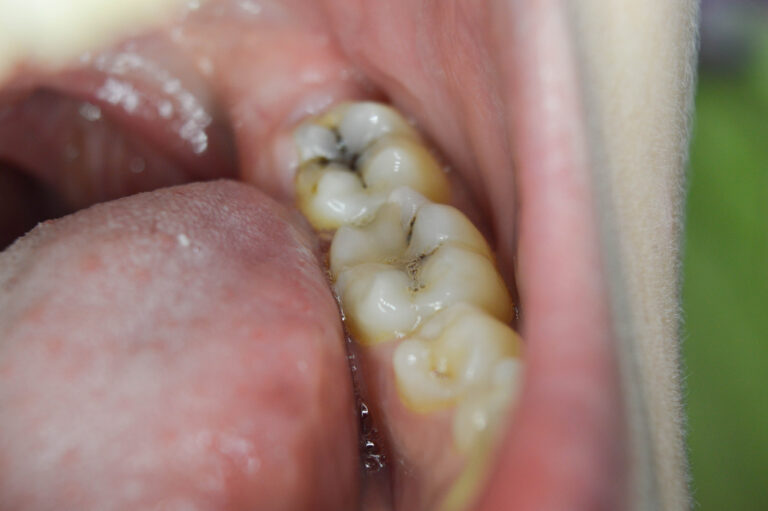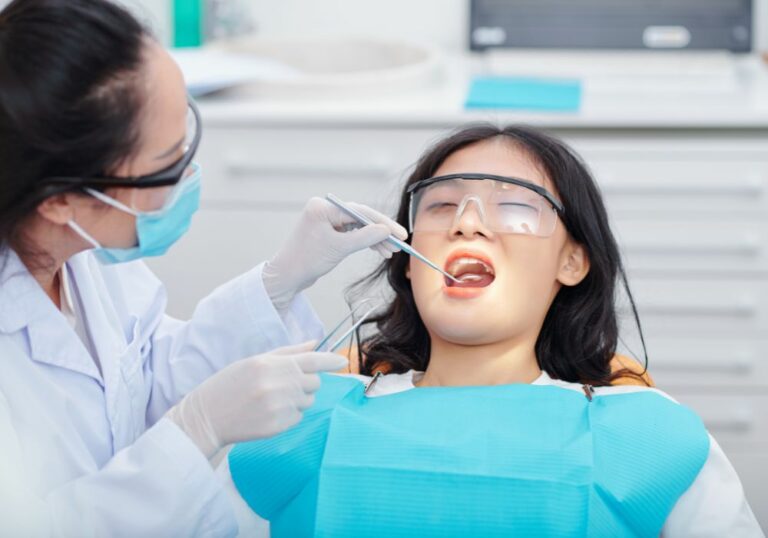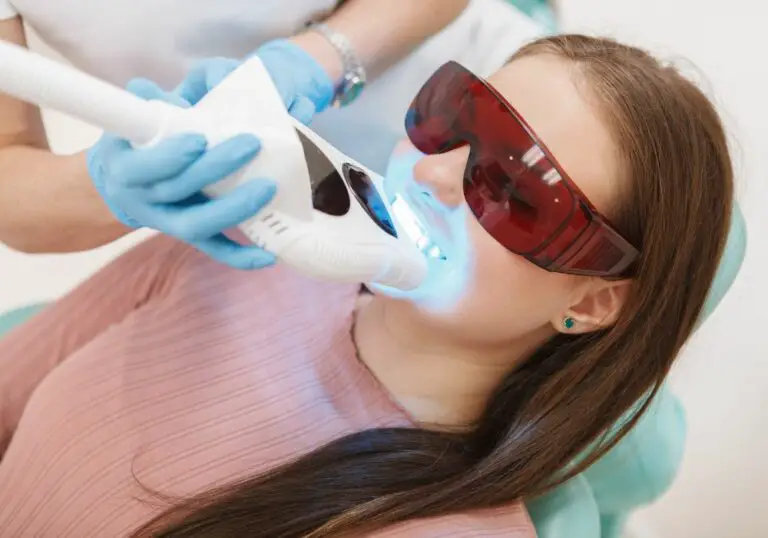When you’re feeling depressed, even basic tasks like brushing your teeth can feel overwhelming. However, neglecting your oral hygiene can have serious consequences, such as tooth decay and gum disease. It’s important to find ways to keep your teeth clean and healthy, even when you’re struggling with depression.
One simple trick is to invest in a good fluoride rinse mouthwash. If you’re not up to brushing your teeth, a 1-minute swish of mouthwash can help manage oral hygiene by killing bad bacteria in your mouth. When shopping for a mouthwash, opt for the non-alcohol version to avoid drying out your mouth.
Another helpful tip is to set reminders for yourself to brush your teeth and practice good oral hygiene. You can use your phone or a sticky note on your mirror to remind yourself to brush twice a day, floss, and rinse with mouthwash. Additionally, try to make your oral hygiene routine as easy and convenient as possible by keeping your toothbrush and other oral care products within easy reach.
Understanding Depression and Oral Health

Depression is a mental health condition that can affect your mood, thoughts, and behavior. It can make it difficult to carry out daily tasks, including taking care of your oral health. Poor oral hygiene can lead to a range of dental problems, including gum disease, tooth decay, and bad breath.
When you’re feeling depressed, it can be hard to find the motivation to brush and floss your teeth regularly. However, neglecting your oral health can make your depression worse. It’s important to understand the connection between depression and oral health, and take steps to maintain good oral hygiene.
Here are some ways that depression can affect your oral health:
- Dry Mouth: Depression can cause a decrease in saliva production, which can lead to dry mouth. Dry mouth can increase your risk of cavities and gum disease.
- Poor Nutrition: Depression can lead to changes in your eating habits, which can result in poor nutrition. A lack of essential vitamins and minerals can weaken your teeth and gums, making them more susceptible to decay and infection.
- Neglecting Oral Hygiene: Depression can make it difficult to find the motivation to brush and floss your teeth regularly. Neglecting your oral hygiene can lead to a buildup of plaque and bacteria, which can cause gum disease and tooth decay.
- Medications: Some medications used to treat depression can cause dry mouth, which can increase your risk of dental problems.
It’s important to understand that taking care of your oral health can help improve your overall well-being. By maintaining good oral hygiene, you can reduce your risk of dental problems and improve your self-confidence.
Establishing a Simple Dental Hygiene Routine
Taking care of your teeth is important for your overall health, but it can be difficult to maintain good dental hygiene when you’re feeling depressed. Establishing a simple dental hygiene routine can help you keep your teeth clean and healthy, even when you’re not feeling your best.
Choosing the Right Tools
To establish a simple dental hygiene routine, start by choosing the right tools. Here are some tips to help you choose the right tools for your dental hygiene routine:
- Toothbrush: Choose a soft-bristled toothbrush that is comfortable to hold and use. Look for a toothbrush with a small head that can easily reach all areas of your mouth.
- Toothpaste: Choose a toothpaste that contains fluoride to help prevent cavities. Look for a toothpaste that has a flavor you enjoy to make brushing more enjoyable.
- Floss: Choose a floss that is comfortable to use and can easily reach between your teeth. If traditional floss is difficult to use, try using a floss pick or water flosser instead.
Creating a Routine
Once you have the right tools, it’s time to create a simple dental hygiene routine. Here are some steps you can take to establish a routine:
- Brush your teeth twice a day for two minutes each time. Use a circular motion to brush all surfaces of your teeth, including the front, back, and top.
- Floss your teeth at least once a day to remove plaque and food particles from between your teeth.
- Rinse your mouth with water or mouthwash after brushing and flossing to help remove any remaining debris.
- Visit your dentist regularly for check-ups and cleanings.
By following these simple steps, you can establish a dental hygiene routine that will help keep your teeth clean and healthy, even when you’re feeling depressed. Remember, taking care of your teeth is an important part of taking care of your overall health, so make it a priority in your daily routine.
Incorporating Healthy Eating Habits
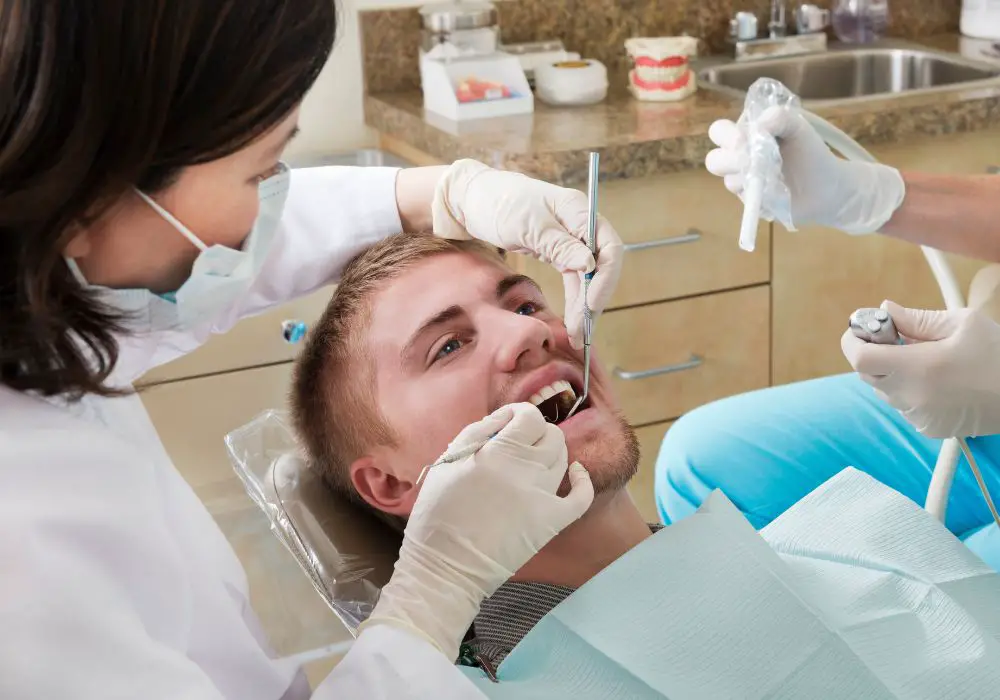
When you’re feeling depressed, it can be tough to maintain healthy habits, including eating well. However, making an effort to eat a balanced diet can have a positive impact on your overall health, including your oral health. Here are some tips for incorporating healthy eating habits to keep your teeth clean:
Avoiding Harmful Foods
Certain foods can be harmful to your teeth, especially when consumed in excess. Sugary and starchy foods, for example, can promote the growth of harmful bacteria in your mouth, leading to tooth decay. Acidic foods and drinks can also erode your tooth enamel, making your teeth more vulnerable to decay. To keep your teeth healthy, try to limit your consumption of the following:
- Candy, cookies, and other sweets
- Chips, crackers, and other starchy snacks
- Soda, sports drinks, and other sugary drinks
- Citrus fruits and juices
- Vinegar-based salad dressings and sauces
Embracing Teeth-Friendly Foods
On the other hand, there are plenty of foods that are good for your teeth. Incorporating these foods into your diet can help keep your teeth clean and healthy. Here are some teeth-friendly foods to consider:
- Dairy products like milk, cheese, and yogurt, which are rich in calcium and can help strengthen your teeth
- Crunchy fruits and vegetables like apples, carrots, and celery, which can help scrub your teeth clean as you chew
- Leafy greens like spinach and kale, which are high in vitamins and minerals that promote oral health
- Nuts and seeds, which are a good source of calcium and other minerals that can help strengthen your teeth
By making an effort to avoid harmful foods and embrace teeth-friendly ones, you can help keep your teeth clean and healthy, even when you’re feeling down.
Seeking Professional Help
If you’re struggling with depression, it’s important to seek professional help to manage your mental health. But did you know that seeking professional help can also benefit your oral health? Here are some ways that seeking professional help can help you keep your teeth clean when depressed.
Regular Dental Check-Ups
Regular dental check-ups are essential for maintaining good oral health, especially when you’re feeling depressed. When you visit your dentist, they can check for signs of tooth decay, gum disease, and other oral health problems. They can also provide you with tips and tricks for maintaining good oral hygiene, even when you’re not feeling your best.
Therapeutic Assistance
Therapeutic assistance can also be beneficial for maintaining good oral health when you’re feeling depressed. Therapists can help you manage your depression and develop coping strategies for dealing with the challenges of daily life. They can also help you develop a routine for maintaining good oral hygiene, even when you’re not feeling motivated.
In addition to therapy, there are other forms of therapeutic assistance that can be helpful for managing depression and maintaining good oral health. For example, ketamine therapy has been shown to be effective in treating depression, particularly in individuals who have not responded to other treatments such as antidepressants. If you’re considering ketamine therapy for your depression, be sure to discuss the potential benefits and risks with your healthcare provider.
Remember, seeking professional help is an important step in managing your depression and maintaining good oral health. Don’t hesitate to reach out to your dentist or therapist if you’re struggling to keep your teeth clean when depressed.
Involving Loved Ones
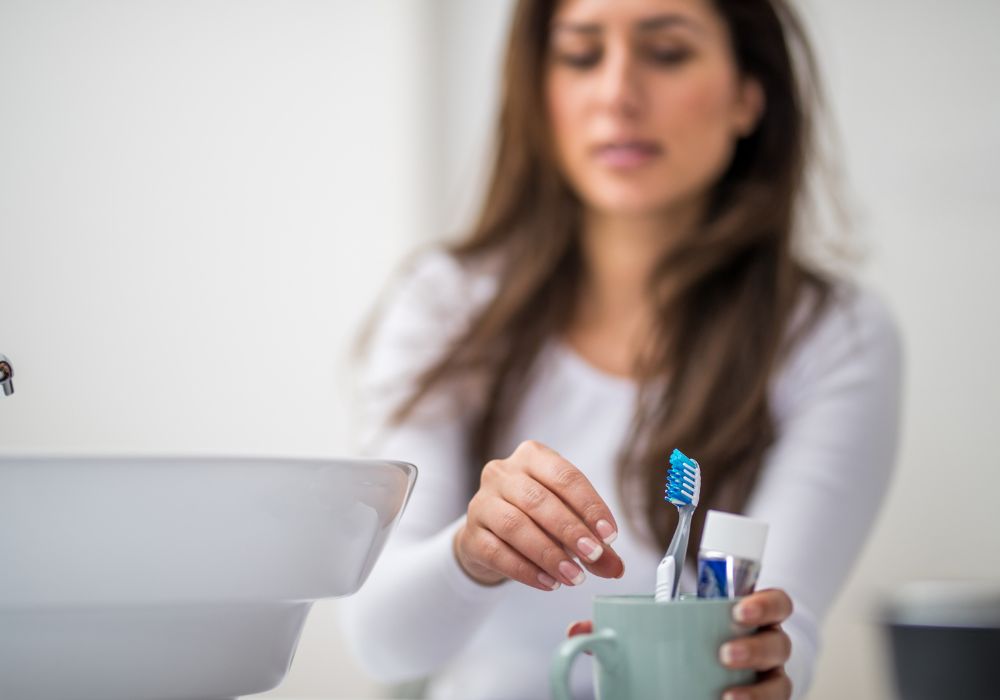
When you are feeling depressed, it can be difficult to take care of yourself, including your oral hygiene. However, involving loved ones can be a great way to get the support you need to keep your teeth clean and healthy. Here are some ways you can involve your loved ones:
Sharing Your Struggles
It can be hard to talk about your struggles with depression, but sharing your struggles with loved ones can help them understand what you are going through and how they can support you. Let them know how depression is affecting your ability to take care of yourself, including your oral hygiene. This can help them understand why you may need their help.
Accepting Help
Your loved ones may want to help you with your oral hygiene, but they may not know how to do so. Let them know what kind of help you need. For example, you could ask them to remind you to brush your teeth or to brush your teeth with you. You could also ask them to help you find oral hygiene products that are easy for you to use when you are feeling depressed, such as a toothbrush with a larger handle or pre-packaged floss picks.
Remember that accepting help is not a sign of weakness. Your loved ones want to support you, and accepting their help can make it easier for you to take care of yourself when you are feeling depressed.
Using Reminders and Alarms
When you’re feeling depressed, it can be difficult to keep up with daily routines like brushing your teeth. That’s where reminders and alarms can come in handy. Here are a few tips to help you use reminders and alarms to keep your teeth clean:
- Set reminders on your phone: Use your phone’s built-in reminder app to set alerts for when it’s time to brush your teeth. You can set these reminders to go off at the same time every day, or at different times depending on your schedule.
- Use a tooth brushing app: There are several apps available that can help you keep track of your tooth brushing habits. Some apps even come with built-in timers to make sure you brush for the recommended two minutes.
- Set alarms for other hygiene tasks: If you struggle with other hygiene tasks like washing your face or taking your medication, consider setting alarms for those tasks as well. This can help you establish a routine and make it easier to remember to take care of yourself.
- Keep a checklist: Create a checklist of all the hygiene tasks you need to complete each day, including brushing your teeth. You can check off each task as you complete it, which can help you feel a sense of accomplishment and motivate you to keep going.
By using reminders and alarms, you can make it easier to keep up with your daily hygiene routine even when you’re feeling depressed. Experiment with different methods to find what works best for you, and don’t be afraid to ask for help if you need it.
Keeping a Positive Mindset
When you’re feeling depressed, it can be challenging to maintain a positive mindset. However, it’s crucial to keep a positive attitude, especially when it comes to your oral health. Here are some tips to help you stay positive:
- Focus on the things you can control: You may not be able to control your depression, but you can control your oral hygiene routine. By focusing on what you can control, you can feel empowered and motivated to take care of your teeth.
- Practice self-care: Self-care is essential, especially when you’re feeling down. Take some time to do things that make you feel good, such as taking a warm bath, reading a book, or going for a walk. When you take care of yourself, you’ll feel better both physically and mentally.
- Surround yourself with positive people: Surrounding yourself with positive people can help boost your mood and keep you motivated. Spend time with friends and family who make you feel good about yourself.
- Practice gratitude: Take some time each day to reflect on the things you’re grateful for. This can help shift your focus from negative thoughts to positive ones.
- Use positive affirmations: Positive affirmations can help boost your self-esteem and keep you motivated. Repeat positive affirmations to yourself, such as “I am strong,” “I am capable,” and “I am worthy.”
By keeping a positive mindset, you can stay motivated to take care of your teeth, even when you’re feeling down. Remember to focus on what you can control, practice self-care, surround yourself with positive people, practice gratitude, and use positive affirmations.
Frequently Asked Questions
How can depression affect your dental hygiene?
Depression can have a negative impact on your dental hygiene. When you are feeling down, it can be difficult to find the motivation to brush and floss regularly. Additionally, depression can cause fatigue, which can make it harder to maintain good oral hygiene habits.
What are some tips for taking care of your teeth when feeling down?
If you are struggling with depression, it is still important to take care of your teeth. Here are a few tips to help you maintain good dental hygiene:
- Set a routine: Try to brush and floss at the same time every day, even if you don’t feel like it.
- Use a fluoride rinse: If you can’t bring yourself to brush, try using a fluoride rinse to kill bacteria in your mouth.
- Choose healthy snacks: Eating sugary or starchy foods can increase your risk of tooth decay. Opt for healthy snacks like fruits and vegetables instead.
- Seek support: Talk to your doctor or a mental health professional if you are struggling with depression. They can help you find ways to manage your symptoms and take care of your overall health.
Can depression cause dental problems?
Yes, depression can cause dental problems. When you are dealing with depression, you may be less likely to take care of your teeth, which can lead to issues like gum disease, tooth decay, and bad breath.
Why is it important to maintain good dental hygiene even when depressed?
Maintaining good dental hygiene is important for your overall health, even when you are feeling down. Poor oral hygiene can lead to a variety of dental problems, including cavities, gum disease, and tooth loss. Additionally, research has shown that there may be a link between poor oral health and other health issues like heart disease and diabetes.
What are some common dental issues associated with depression?
Some common dental issues associated with depression include gum disease, tooth decay, and bad breath. When you are feeling down, you may be less likely to brush and floss regularly, which can lead to these and other dental problems.
How can a dentist help with dental problems caused by depression?
If you are struggling with dental problems caused by depression, your dentist can help. They can provide treatment for issues like gum disease and tooth decay, and may also be able to recommend strategies for maintaining good oral hygiene even when you are feeling down. Additionally, your dentist may be able to refer you to a mental health professional who can help you manage your depression.


